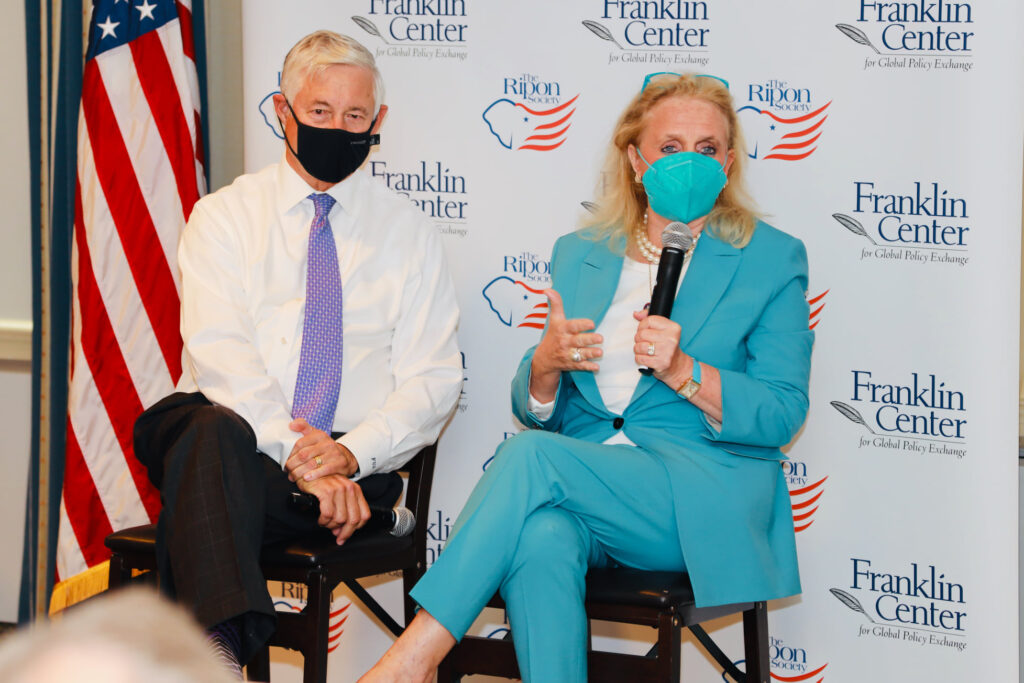
Upton & Dingell Talk About the Need for Health Care Reform in the United States
WASHINGTON, DC – U.S. Reps. Fred Upton (R/MI-6) and Debbie Dingell (D/MI-12) appeared this past Thursday morning before a breakfast meeting of The Ripon Society and Franklin Center for Global Policy Exchange, delivering remarks about strengthening the health care system in America and why it is important for Republicans and Democrats to set politics aside and work together in this regard.
“I’ve always been bipartisan,” Upton stated. “I changed the rules of our Committee when I became Chairman … Bipartisan amendments went first.” Upton was referring to his time as Chairman of the Energy and Commerce Committee, which he led from 2010 to 2016. As Chairman, the Michigan Republican earned a reputation not only as one of the leading authorities on health care reform in Congress, but as a goal-oriented leader who was committed to working across the aisle to get the job done.
This bipartisan, inclusive approach was on full display during consideration of the landmark 21st Century Cures Act in 2016.
“Our committee approved it 53-0,” Upton recalled. “Diana DeGette and I were the two leads, but everybody was a huge participant. We had dozens of roundtables, hearings, and trips around the country, whether it was to MD Anderson, the University of Michigan, Washington State, or Oregon. Every Member participated, and it was an amazing bill, passing 392 to 26 on the House floor. We survived the filibuster that was led by Elizabeth Warren and Bernie Sanders in the Senate. We got 75 votes — even Schumer voted against proceeding. But we won 92-8 on the Senate floor.”
Five years later, Upton credits the 21st Century Cures Act with helping to pave the way for the COVID-19 vaccines being developed and approved in record time.
“That came about because of what we did on Cures to expedite the approval of drugs and devices which allowed for the EUA — Emergency Use Authorization,” he stated. “It allowed Pfizer and J&J and Moderna to actually produce the vaccine before it was approved. So that when it was approved in December of ’20, they literally started shipping it the very next day out of Kalamazoo. It was incredible. And you can say that we saved millions of lives.”
He added that he and DeGette are now working on a follow-up version of the 21stCentury Cures Act that builds on what has been learned since the legislation was signed into law by President Obama in 2016.
“DeGette and I have been working on version 2.0 since 2018,” he noted. “And we’ve learned a lot. We learned that the [drug] trials ought to be more diverse. That was one of the faults we had with the COVID vaccine. People of color didn’t feel that they were well-represented, and therefore were very leery. We’re still not over that, and that needs to change.”
He also touched on what he sees as one of the key elements of the follow-up legislation — the establishment of an Advanced Research Projects Agency for Health (ARPA-H).
“ARPA-H really duplicates what DARPA has done for the Defense Department and Energy,” he said. “The President talked a lot about this in his address to Congress earlier this year. The appropriators have $3 billion already in this bill, so we’re going to do the authorizing part. We want to make sure that it’s independent and it’s able to have the nimbleness and flexibility to really identify drugs and devices that might go outside of the scope of the normal bureaucratic delays to get things approved. We’re excited to get it done, and we expect that to be a big part of the bill that we introduce as early as maybe next week. Our goal is to get it to the President before the end of the year.”
Dingell opened her remarks by talking about her working relationship with her home state Republican colleague, and why working across the aisle is needed now perhaps more than ever.
“Fred and I work on a lot of health care issues together,” she stated. “We work on a lot of issues together. I think we all need to look at what Ken Burns said this week, where he talked about this country is as divided as we were when we had the Civil War. I really worry about what’s happening. I think the fundamental pillars of our democracy are being attacked. I think simple, common sense has become the most controversial.”
Despite these challenges, Dingell said she remained hopeful that common ground can be found on some key areas of health care, but also acknowledged that differences on some fundamental issues remain.
“I think there are a lot more areas of agreement than people realize on health care,” she observed. “I also think there are some big areas that we’ve got to find some solutions for and bring people together on. I guess I’ll start with the big one that I’ll never get Fred to agree with me on, but I still think we need to address in this country.
“I’m a Dingell, okay? We all remember that John Dingell’s father was the author of Social Security, and that he introduced universal health care in the early ‘40s. And I just think every American has got a right to health care. That when you get sick, you should be able to go to the doctor. You shouldn’t have to worry if you can afford it, and you shouldn’t have to worry if you can afford the medicine.”
“You do not know how broken the system is until you’re in it. For example, Medicaid requires that you have no assets, so if you have a married couple with a spouse who has Alzheimer’s or a spouse who’s got serious cancer or a spouse who needs to be in assisted living, the spouse has to lose all of their assets. You have to sell your home to be able to even afford to take care of your spouse. That’s not right.”
To address this problem, Dingell noted that she and Upton have introduced the Protecting Married Seniors from Impoverishment Act, which would extend financial protections to seniors who receive long-term care in their home or a community setting. The bill’s key provisions include:
– A Community Spouse Resource Allowance. While the institutionalized spouse may have no more than $2,000 in savings in order to qualify for Medicaid in most states, Federal law mandates that states allow the community spouse to retain a modest amount of their assets at the time of application to cover basic living and health expenses. This is called the “community spouse resource allowance (CSRA).” In 2018, the minimum a state may allow a community spouse to retain is $24,720 and the maximum is $123,600. Within those ranges, most states require a split, so for a couple with $100,000 in excess resources, the community spouse may be permitted to keep $50,000.
– Exclusion of a Community Spouse’s Income. Medicaid does not count the community spouse’s income when determining whether the institutionalized spouse is eligible for Medicaid. However, in some states, if the community spouse’s income exceeds a certain threshold, he or she may be liable for court-ordered support for the cost of the sick spouse’s care.
– Minimum Monthly Needs Allowance. The community spouse is also entitled to a minimum monthly maintenance needs allowance (MMMNA). In 2018, this ranges from a minimum of $2,057.50 to $3,090 a month. If the community spouse’s income is below the MMMNA limit, then the institutionalized spouse’s income can be used to supplement the difference.
Dingell concluded by reiterating the importance of both parties trying to set aside politics to solve the health care challenges that Americans face.
“We’ve got to find a way because there really are problems,” she said. “They’re not Republican problems or Democratic problems. We all have constituents who need to be able to go to the doctor. We want people to be able to get their medicine. We want people to live a long time. We want to take care of children. We want to take care of seniors. So I think we should try to work together more, not less.”
To view Upton and Dingell’s remarks in full, please click on the link below:
The Ripon Society is a public policy organization that was founded in 1962 and takes its name from the town where the Republican Party was born in 1854 – Ripon, Wisconsin. One of the main goals of The Ripon Society is to promote the ideas and principles that have made America great and contributed to the GOP’s success. These ideas include keeping our nation secure, keeping taxes low and having a federal government that is smaller, smarter and more accountable to the people.



